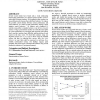Free Online Productivity Tools
i2Speak
i2Symbol
i2OCR
iTex2Img
iWeb2Print
iWeb2Shot
i2Type
iPdf2Split
iPdf2Merge
i2Bopomofo
i2Arabic
i2Style
i2Image
i2PDF
iLatex2Rtf
Sci2ools
115
Voted
SIGIR
2008
ACM
2008
ACM
User adaptation: good results from poor systems
Several recent studies have found only a weak relationship between the performance of a retrieval system and the "success" achievable by human searchers. We hypothesize that searchers are successful precisely because they alter their behavior. To explore the possible causal relation between system performance and search behavior, we control system performance, hoping to elicit adaptive search behaviors. 36 subjects each completed 12 searches using either a standard system or one of two degraded systems. Using a general linear model, we isolate the main effect of system performance, by measuring and removing main effects due to searcher variation, topic difficulty, and the position of each search in the time series. We find that searchers using our degraded systems are as successful as those using the standard system, but that, in achieving this success, they alter their behavior in ways that could be measured, in real time, by a suitably instrumented system. Our findings sug...
Related Content
| Added | 15 Dec 2010 |
| Updated | 15 Dec 2010 |
| Type | Journal |
| Year | 2008 |
| Where | SIGIR |
| Authors | Catherine L. Smith, Paul B. Kantor |
Comments (0)

